Fat, slow and old ...
"The strange, chained linky thing became my best friend, and I called it a chain harrow, I might be a bit late to patent this, but there you are"
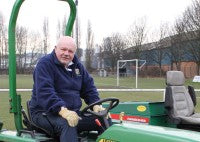 Warley Rugby Football Club's present home is in Tatbank Road, Oldbury, West Midlands, just a stone throw from junction 2 of the M5. It is one of only two rugby clubs in the borough of Sandwell, the other being Wednesbury, with whom we have a very cordial relationship.
Warley Rugby Football Club's present home is in Tatbank Road, Oldbury, West Midlands, just a stone throw from junction 2 of the M5. It is one of only two rugby clubs in the borough of Sandwell, the other being Wednesbury, with whom we have a very cordial relationship.
The club was formed in 1970 and started life playing on Local Authority pitches. The social side was quite nomadic, moving from pub to pub or social club to social club. I joined up with them in the middle 80s.
I was just coming up to thirty years of age, so a late starter. Having dabbled and failed in other sports, I was delighted to find that fat, slow, old blokes could be referred to as sportsmen in rugby parlance. So began my illustrious junior rugby career in the front row. After twenty-two years of neck and back shortening competition, played largely, in my case, without a ball, my body finally called time.
In the early 90s Warley hitched up with Smethwick Cricket Club and, in those years, gained a lot of experience on just how a sports facility was run on the business side.
Almost inevitably, we fell out of love with one another and Warley moved to yet another pub. There followed a general period of decline in junior rugby. When I started, most clubs were fielding four adult sides, by the middle 90s almost all were down to two. Towards the end of the 90s Warley were in a mess and down to just one adult side.
However, we had not lost our old boys who had gained that invaluable experience at Smethwick CC. We had to have a long hard look at ourselves and, in doing so, the easiest decision would have been to give up and drink to the memory. Fortunately, enough players and members decided to take up the fight, and a slow resurgence started to take shape.
As stunned as I was to become a slow, fat, old sportsman, I was even more stunned, in 2001, to become chairman. Happily, a very proactive committee surrounded me. A nice mixture of 'old head' experience and youthful enthusiasm.
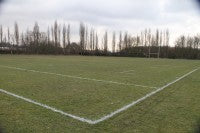 Perhaps our greatest stroke of luck came that year in the shape of our current home, formerly the Albright and Wilson factory sports ground. Rhodia UK, who bought out Albright and Wilson, were clearly tired of the distraction of administering the facility and were looking to lease it out. The experience at Smethwick CC now paid off as we beat off two rival bids and secured a lengthy lease.
Perhaps our greatest stroke of luck came that year in the shape of our current home, formerly the Albright and Wilson factory sports ground. Rhodia UK, who bought out Albright and Wilson, were clearly tired of the distraction of administering the facility and were looking to lease it out. The experience at Smethwick CC now paid off as we beat off two rival bids and secured a lengthy lease.
This gave us one rugby pitch, two football pitches and a sizeable training area. Another good decision that the club made was to hold onto our old site in St John's Road, Smethwick. This consisted of two local authority pitches - one rugby and one football - but, in which, we had previously secured a long lease on the changing rooms and surrounding grounds.
This was done before our demise of the late 90s.
We'll roll forward to 2010. We have managed to field a third team for the first time in about fifteen years. We have a Colts team, thriving youth section and a female side playing in a development league. In 2005 we marked our 35th year with over 400 guests at a dinner at the International Convention Centre on Broad Street, Birmingham. We are just planning our 40th. Oh Lord!
Back to the resurgence, in order to make our new home work, we realised we needed to retain the two football pitches and the inherited crown bowling green. There was an element of mistrust in the early stages as these groups had been here before our arrival.
We never intended for our new home to be anything other than a multi sports facility, and it has proved to be the right path. As well as all of our rugby, we stage Midland Youth league football on Saturday mornings and Birmingham AFA on Saturday afternoons.
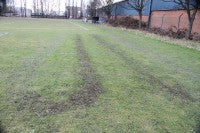 On Sundays it is local Sunday league adult football in the mornings and youth in the afternoons. Our crown green bowling and dominoes sections happily fill the small gap between seasons. Our old site serves as a rugby overspill and alternative training area. It also has a mini football pitch, which attracts weekly use.
On Sundays it is local Sunday league adult football in the mornings and youth in the afternoons. Our crown green bowling and dominoes sections happily fill the small gap between seasons. Our old site serves as a rugby overspill and alternative training area. It also has a mini football pitch, which attracts weekly use.
All this activity helps us maintain a licensed bar open seven days a week.
Our new home was constructed in 1956 over old industrial grounds. Every now and then we have found the remnants of building foundation, thankfully, not in any playing areas. It did have proper drainage and about twelve inches of rootzone soil. Twelve inches denoting the age of the map I found all this on.
Put a fork fully into the ground and you can feel and hear the aggregate crunch. Despite the fact that the drains are probably silted up or collapsed, the playing areas do drain reasonably well.
At its height, Albright's facility was widely admired, as was a lot of local factory sports grounds of its time. In the years leading up to our lease it had suffered much neglect, which also brought its challenges. For, just as I was surprised that a fat, old, slow bloke could be called a sportsman, I never in my wildest dreams believed I would ever be referred to as a groundsman. It just kind of happened (this is not exactly how I view myself but, perhaps, the views of those who watch me wander around with a garden fork or line-marking machine).
I obviously felt, as the chairman, I should be doing my bit. The only kit we inherited was a large agricultural looking roller and a strange, chained linky thing, which I discovered buried in long grass.
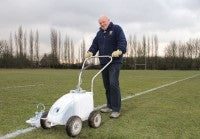 I attempted to cut the rugby pitch with an under powered pedestrian rotary. It took me two days and I hadn't even looked at the football pitches. I did wonder what on earth we had taken on. All those years of playing and I had never given a thought as to how the pitch actually got there. Well, that was the summer, now came the season.
I attempted to cut the rugby pitch with an under powered pedestrian rotary. It took me two days and I hadn't even looked at the football pitches. I did wonder what on earth we had taken on. All those years of playing and I had never given a thought as to how the pitch actually got there. Well, that was the summer, now came the season.
I started by consulting the players on what they wanted. "Well that pitch needs rolling for a start, its dangerous". So my early experience was towing the large roller with an ancient dumper truck to 'improve things'. By the way, the dumper truck had agricultural tyres. "How's that?" I would enquire. "Well it's sort of level, except for the tyre marks you've left everywhere, what happened to the grass?" "I don't know, it seemed to be there before I started rolling. Must be the time of the year." Of course, I could not understand why, when it rained there were all those puddles where the grass used to be.
In my first season, I visited untold carnage upon already neglected sports surfaces. I was badly in need of a Damascus Road moment, which happily came when I stumbled upon the Pitchcare website. Damascus Road it was, when I discovered that everything I believed was right was absolutely wrong, everything that was wrong was actually right.
In my new enlightenment, the roller now sulks in a dark corner and the dumper dumps things on building sites. The strange, chained linky thing became my best friend, and I called it a chain harrow, I might be a bit late to patent this, but there you are.
I attended a winter pitch course which, by now, was assuring as it confirmed that what I now believed to be right was still right.
As I stated earlier, me being referred to as a groundsman, will make a lot of properly trained, well grounded and knowledgeable turf practitioners wince. I more than recognise that I am still in learning, and I totally accept that, in the grand scale of grounds people, I am very much a willing volunteer.
Happily, my rolling days were nine years ago. That has given me a lot of time to harvest a lot more good practice from Pitchcare and its many contributors.
The cl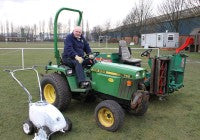 ub does have a decent business plan. I have always been one of the 'spend a bit and save a bit' brigade. We have also had some success in gaining grants through the RFU and the FA. This allowed us the luxury of some decent second hand machinery. Each year provision has been made to add something to the fleet.
ub does have a decent business plan. I have always been one of the 'spend a bit and save a bit' brigade. We have also had some success in gaining grants through the RFU and the FA. This allowed us the luxury of some decent second hand machinery. Each year provision has been made to add something to the fleet.
Currently, we have a John Deere 755 tractor (with turf tyres). It has PTO and three point lift. That enables me to tow the chain harrow or, more recently, a Sisis Quadraplay. I was always impressed with the levelling job that the harrow did, but I am bowled over by the Quadraplay. It has a grooming rake, roller, slitter and brush, in that order. It's the only combination I have used it in at the moment, it really works wonders on the levels and leaves the aeration open. It certainly helps time wise.
A Ransomes 2130 triple, again second hand, has been a real godsend; it makes slight work of the cutting. At the main site the three pitches, training and surrounding areas, I guestimate to be about eight acres. Usually, I can get this all cut in three hours which, compared to the two days I spent just doing the rugby pitch nine years earlier, is just heaven.
A Multi Slit before Christmas and a Groundsman aerator alternate with the Quadraplay, introducing aeration to the soil at varying depths. For good measure we bought a new finishing rotary mower. This works a treat off the PTO on the John Deere, and really sorts out that tall white stalky rye when it becomes so damn proud of itself in early summer.
For marking out, we inherited an old dry powder marker but it is rarely used. Again, through grants, we purchased a spray marker and it has been a terrific workhorse. We have a wheel to wheel and that too gets a lot of use. I mark out weekly as the surfaces get a lot of use over each weekend.
In our early days, we contracted out the summer renovations. A necessary but costly process. It was useful in two ways - one I learned by watching, and two we could use the cost as matched funding in some of our early grant applications.
Now we do most of the renovations ourselves, as a topdresser and a seeder are part of the fleet. I usually have to book the best part of a week off work just to do it. It is hard work as they are not big pieces of machinery, but it is so satisfying to see it all coming together.
Happily, we only need to mark out at our other site, as the management agreement includes the local authority doing the cutting and renovation. It is open parkland so gets quite a bit of use by the locals. Equipment up there is limited to a wheel to wheel. It still takes up quite some time but, this season, I have been joined in my labours by another two willing volunteers.
Karl Blick is a regular player who manages to fit in youth coaching as well as being a committee man. Don Poole is a former player and current Chair of Players, busily gathering 2/3 sides, plus replacements a week. They have been a tremendous asset as, trying to do both sites, I was pretty much at my limit.
Every year now, we have to contract out for Earthquaking or Vertidraining. I don't feel we could justify any investment in kit as expensive as that, even if I had a tractor that could handle it.
Another problem is spraying for weeds. I have found that the site is too big for a small boom on the spray marker, believe me I have tried it. The low capacity and trudge back to the water source makes it very labour intensive and time consuming. It was taking at least three hours per pitch, often after a day's work at my real job, I would turn up to find it was just too windy to complete the task. Then you start getting behind with yourself, so we are contracting that job out as well. It may be, with time and finance, that we are able to invest in a bigger towed sprayer and shroud; we will see.
I still have a proper day job, so time is always an issue. I tend to go for time owing rather than payment when I am busy so, when needs be, I can get a couple of days off to do some proper work down at the club. However, in winter, there are still times when I end up marking out with a torch for a few weeks.
I set out believing we could do everything ourselves, probably saving some money into the bargain. I realise now that some tasks don't save you money because they don't get done, they are best left to others. Its all a question of balance I suppose.
The beauty of it all is that I often wondered what I would do with myself when this fat, slow, old sportsman hung up his rugby boots. Well it has been almost a seamless transition to fat, slow, old and, of course, grumpy erm, groundsman!
